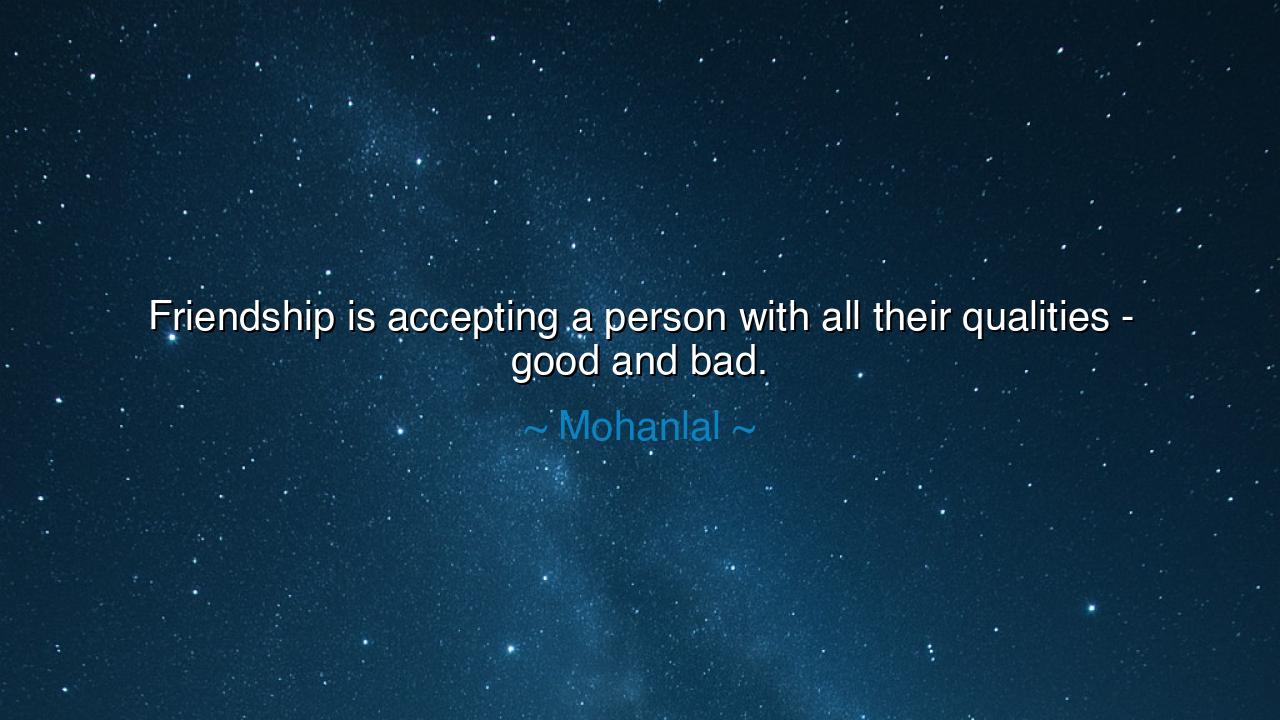
Friendship is accepting a person with all their qualities - good






"Friendship is accepting a person with all their qualities - good and bad." These profound words, spoken by Mohanlal, strike at the very heart of what it means to truly love and understand another human being. The essence of friendship, as he speaks of it, is not the simple exchange of pleasantries, nor the fleeting moments of shared joy, but a deeper, more enduring connection. True friendship requires the acceptance of another in their entirety—the good and the bad, the light and the shadow. This is not merely about tolerance, but about a profound willingness to embrace another’s imperfections, to understand their flaws, and to stand by them regardless of the storm they may bring.
In the ancient world, the notion of accepting others with their flaws was not a mere philosophical concept but a way of life. The great Greek philosophers spoke often of virtue, and of how a true friend was one who stood beside another not because of shared advantages, but because of a shared commitment to what is good, even in the face of imperfection. Aristotle himself wrote that friendship is one of the highest virtues because it represents the union of souls who do not merely wish for each other’s happiness in easy times, but in the deepest of struggles. Aristotle understood that friendship was not a transaction of fleeting joys, but a bond that requires patience, understanding, and a willingness to endure hardship.
Consider the relationship between Achilles and Patroclus, as depicted in the Iliad. Their bond was not born from a superficial admiration but from a deep, unconditional love. Even when Achilles' pride and anger caused him to withdraw from the battle, it was Patroclus who, in his own selfless nature, stood in his place. Patroclus knew that Achilles’ flaws—his rage, his stubbornness—were part of him, yet he accepted him fully, with all his imperfections. Achilles, in turn, mourned deeply when Patroclus was killed, his grief not merely for the loss of a friend, but for the recognition that their friendship was a union of not just their strengths, but their weaknesses as well. Their bond teaches us that friendship does not require perfection, but the willingness to stand together, no matter the cost.
We also find this wisdom echoed in the story of David and Jonathan from the Bible. Their friendship was built on deep mutual respect, but also on the acceptance of each other’s humanity. David, the young shepherd who would rise to become king, was far from perfect. He was anointed by God, yet his decisions—his affair with Bathsheba, his violence toward his enemies—were not those of a perfect man. Yet Jonathan, the son of King Saul, saw not David's flaws, but the promise of the man and the honor in their bond. In accepting one another fully, they created a friendship that transcended royal bloodlines, family rivalry, and political pressure. Their story, like that of Achilles and Patroclus, is a testament to how true friendship is about accepting the full essence of another, flaws and all.
But to truly understand the depth of Mohanlal’s words, we must recognize the true challenge of accepting another in their entirety. It is easy to love someone when they are at their best, when their qualities shine and their spirit is light. But friendship, as Mohanlal teaches us, is tested not in times of ease, but in the moments when a person’s flaws and shortcomings come to the forefront. To be a true friend is to see these imperfections and yet stand by that person, not because you are blind to their faults, but because you understand them, you accept them, and you offer your hand not just when they shine, but when they falter.
In the everyday world, we must strive to embody the lesson of Mohanlal's wisdom. Friendship is not about the perfect person, nor about the absence of conflict or flaws. It is about learning to accept another person fully, to understand their failings, and to walk with them through their weaknesses as well as their strengths. True friendship demands the courage to stand by someone not because of what they can offer you, but because of who they are in their entirety. The world often tells us to discard those who do not meet our standards, to only accept the good and reject the bad. But in doing so, we miss the chance for the deepest, most transformative relationships.
Let us then, dear listeners, walk in the path of those who have understood the true nature of friendship. Let us accept each other fully, recognizing that our imperfections are not barriers to love, but part of the shared human experience. As we do so, we will find not only deeper connections with others, but also a deeper understanding of ourselves, for in accepting others, we are called to accept our own imperfections as well. The lesson of Mohanlal is clear: true friendship is not about perfection, but about unconditional acceptance. Let us cherish that, for in it lies the greatest strength of all.






AAdministratorAdministrator
Welcome, honored guests. Please leave a comment, we will respond soon